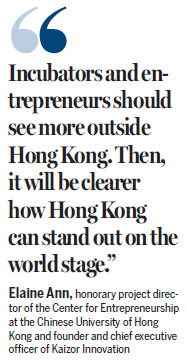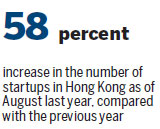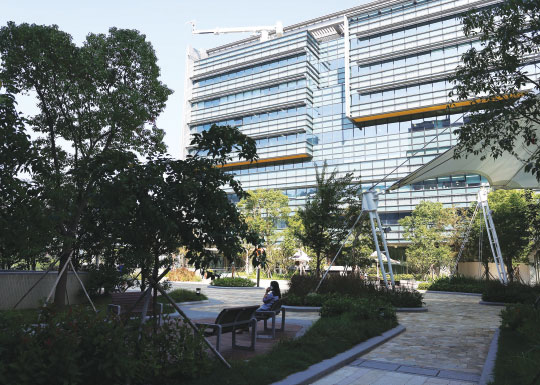Hong Kong is just 'too small a stage' for startups to act
Updated: 2016-06-17 07:54
By Zhou Mo in Hong Kong(HK Edition)
|
|||||||||
While incubators on the Chinese mainland have been under heated discussion over their irrational expansion and ability to achieve sustainable development, Hong Kong's worry is whether the city can retain promising startups and create more in a relatively small market with many people still clinging to a traditional mindset.
But, the positive aspect is that the situation is changing and developing in a direction that could make the SAR a future global technology hub, industry insiders say.
Entrepreneurship used to be an unfamiliar word to many people in Hong Kong a decade ago, when most were keen to embark on finance-related careers, taking advantage of the city's status as an international financial center. The cost of failure in running a business in the city was high with skyrocketing office rents and rising labor costs. Few people were enthusiastic about entrepreneurship.
The trend, however, has been changing in recent years as the Hong Kong government tries to provide more support in terms of policies and finance.

According to a survey by Invest Hong Kong - the city's investment promotion agency - there were 1,558 startups in the city as of August last year, representing a 46-percent, year-on-year growth.
Herman Lam Heung-yeung, chief executive officer at Hong Kong Cyberport Management Co, told mainland media that only 25 startups applied for incubation programs in Cyberport in 2006, But, the number of applicants for the Cyberport Creative Micro Fund and the Cyberport Incubation Program had risen to more than 1,000 last year.
Different from incubators on the mainland, a large number of which rely on office rents from startups to survive, Hong Kong incubators are competing with each other both in the quality of service and specialty, with each having a theme, says Peter Mok, head of incubation programs at Hong Kong Science and Technology Parks Corp (HKSTP).
Brinc, for example, specializes in supporting startups in the "Internet of Things" sector, while AIA Accelerator, powered by early-stage venture capital firm Nest, focuses on helping startups in health tech and wearable businesses.
They are also not just targeting local startup groups, which are still relatively small, but serving a global startup community with entrepreneurs from all over the world flocking in.
According to Mok, among some 240 incubatees in HKSTP's three incubation programs, about 20 percent are from non-Hong Kong-based enterprises.
One of the core advantages Hong Kong incubators have is the high level of internationalization, Lam told mainland media. "We have forged partnerships with not only local industrial parks, but also those on the mainland, the US and other parts of the world. We are more like a bridge, helping overseas companies reach the mainland market and mainland companies go global."

A representative at Cyberport said that, as of March 31, it had helped 43 companies to expand globally. But, in terms of size, Hong Kong is a small market, compared with the mainland. And, according to the representative, raising funds is a major obstacle for startups in the city, especially those looking for funding between seeding rounds and Series A.
Moreover, the growing outflow of entrepreneurs and innovative talents has sparked concern that Hong Kong's innovative capability will be further undermined.
Jordan Lam, a Hong Kong entrepreneur, moved his company to the Qianhai Shenzhen-Hong Kong Youth Innovation and Entrepreneur Hub (E hub) in Shenzhen earlier this year.
Compared with Cyberport, he said, the Houde Entrepreneur Incubator in the E hub can provide more commercial resources.
"Here, we can get to know people in various industries, such as the real estate and hotel sectors. For startups, the most important thing is to be recognizable," says Lam, a director of Fusquare Technology Co, which specializes in providing intelligent control systems for buildings.
Experts, however, see the development in a positive light.
"It makes perfect sense for startups to extend their operations to the mainland market," says Elaine Ann, honorary project director of the Center for Entrepreneurship at the Chinese University of Hong Kong and founder and chief executive officer of Kaizor Innovation.
"Israeli startups did extend their businesses to the US and global markets from day one. What Hong Kong needs to figure out is what it can offer that other incubators on the mainland or other places can't."
"We need mobility to ensure that the best people get to the best places," says Mok.
|
A view of Hong Kong Science Park in Sha Tin. Hong Kong incubators are urged to differentiate themselves from their counterparts across the globe. Angel Navarrete / Bloomberg |
What really makes it attractive to startups, he points out, is a favorable entrepreneurial environment, and this is something the government should strive to create.
"The government needs to support various industries in an appropriate way in terms of policies to facilitate business development and eliminate unnecessary constraints and hurdles, and to enforce very strict rules to ensure that Hong Kong is a level playing field for everyone."
In Mok's view, the biggest challenge that could affect Hong Kong's technology development is the change of mindset among its people, which he called "cultural shift".
Young people, parents and educators, he said, need to gain a deeper understanding of technology and entrepreneurship.
Hilary Szymujko, Brinc's head of programs, also cited access to talents as one of the biggest problems facing startups in Hong Kong. But, she says the exciting thing is there is "a lot of great interest and growing support" for young people to get involved in entrepreneurship at present.
For incubators, meanwhile, finding a unique position to gain a "competitive edge" is the key.
"Incubators and entrepreneurs should see more outside Hong Kong. Then, it will be clearer how Hong Kong can stand out on the world stage," Ann says.
sally@chinadailyhk.com
(HK Edition 06/17/2016 page9)
